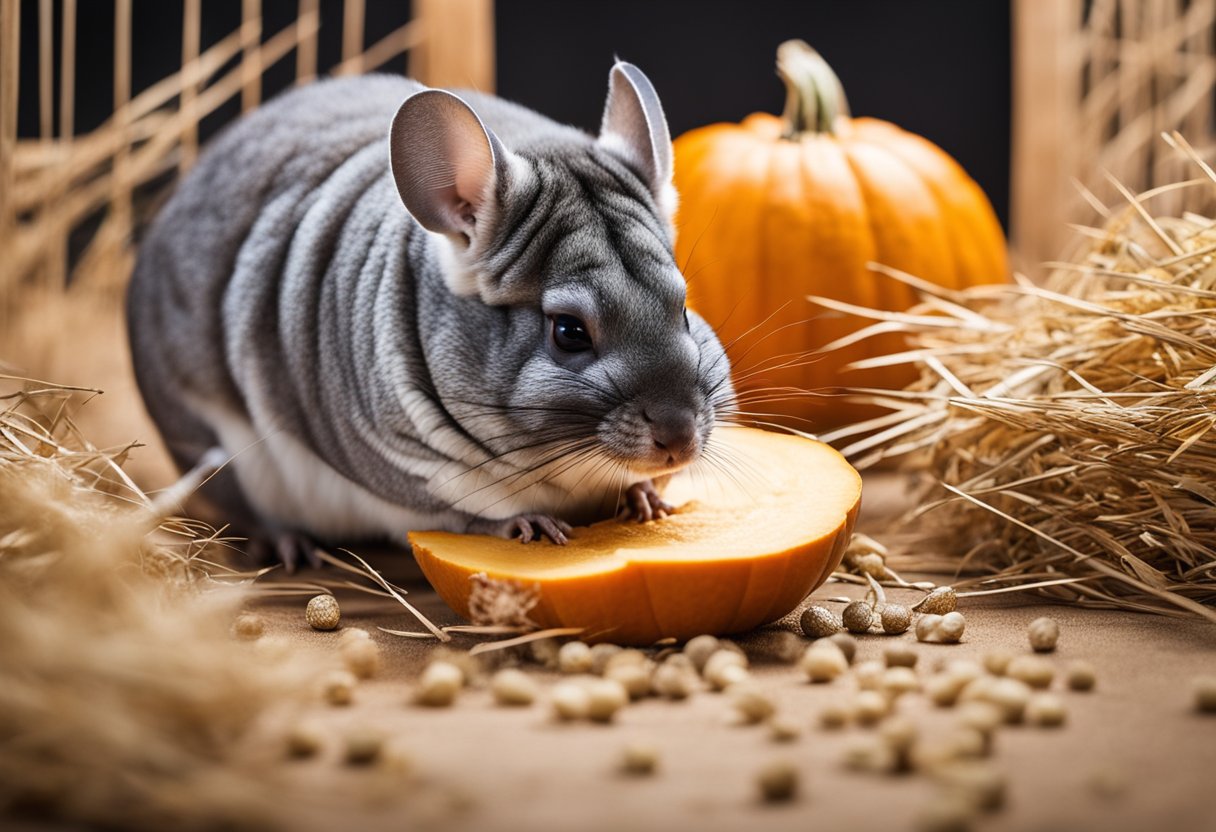Can Chinchillas Eat Pumpkin? Understanding Safe Treats for Your Pet
Chinchillas are unique pets that require a carefully balanced diet to stay healthy. As a responsible owner, you might wonder if it’s safe to share some of your favorite snacks with them. Yes, chinchillas can eat pumpkin in small amounts as an occasional treat. This rich orange vegetable can add a bit of variety to their diet, but moderation is key.

Understanding your chinchilla’s specific dietary needs is important. Their primary food should consist of hay and pellets, but the introduction of safe fruits and vegetables can enhance their nutrition. In this article, you’ll discover everything you need to know about offering pumpkin to your furry friend and how to do it safely to ensure their wellbeing.
Key Takeaways
- Chinchillas can enjoy pumpkin as an occasional treat.
- Their main diet consists of hay and pellets.
- Moderation is essential when introducing new foods.
Chinchillas Dietary Basics

Chinchillas have unique dietary needs that are important for their health. Understanding how their digestion works and what nutrients they require is crucial for keeping your pet healthy.
Understanding Chinchilla Digestive Health
Chinchillas have sensitive digestive systems that require special attention. Their stomachs are designed to process high fiber diets primarily, with hay being a key component.
Key Points:
- Hay: Provides essential fiber and promotes healthy digestion.
- Water: Always ensure your chinchilla has fresh water available.
- Limited Sugars: Foods high in sugar can upset their digestive balance.
A poor diet can lead to digestive issues, including diarrhea and bloating. Keeping a close eye on what your chinchilla consumes helps prevent these problems.
Essential Nutrients and Diet Composition
Your chinchilla’s diet must include a variety of nutrients. Focus on providing the right balance of carbohydrates, protein, fats, and fiber.
Diet Composition:
- Fiber: 30-35% of their diet, mainly from hay.
- Protein: 15-20%, can come from pellet food.
- Carbohydrates: 25-35%, mainly from hay and some vegetables.
- Fat: 3% or less, should come from small amounts of treats.
Introducing treats like pumpkin should be done slowly and in moderation, as they contain sugars that can disrupt your pet’s digestive health. Focus on a balanced diet to ensure your chinchilla stays healthy and happy.
Pumpkin as a Chinchilla Treat

Pumpkin can be a fun and tasty treat for your chinchilla when offered in moderation. It has some benefits but also comes with risks. It’s crucial to understand the right way to provide this food to ensure your pet’s health.
Benefits and Risks of Pumpkin
Pumpkin can provide several benefits for your chinchilla. It is high in fiber, which aids digestion. This can help keep your chinchilla’s gut healthy. Additionally, pumpkin contains vitamins A and C, which are good for overall health.
On the flip side, too much pumpkin can be harmful. It is high in sugar, which can upset your chinchilla’s stomach. Feeding large amounts may lead to diarrhea or other digestive issues. Always introduce new foods slowly and be attentive to your chinchilla’s response.
Safe Feeding Practices for Pumpkin
When adding pumpkin to your chinchilla’s diet, moderation is key. Start with a small piece, about a teaspoon, to see how they react. It’s best to serve fresh, plain pumpkin with no added sugars or spices.
Avoid any canned pumpkin products that may contain preservatives or additives. You can also consider offering small amounts of pumpkin seeds, but these should be limited due to their fat content. Monitor your chinchilla for any signs of digestive distress and adjust the amount accordingly.
Resources

If you’re a chinchilla owner, it’s important to know what foods are safe for your pet. Here are some resources to help you learn more about feeding chinchillas.
- Chinchilla Diet Basics
Understanding the main components of a chinchilla’s diet is essential. This includes hay, pellets, and occasional treats. - Pumpkin for Chinchillas
You can find out if chinchillas can eat pumpkin and how often in this guide: Can Chinchillas Eat Pumpkin?. - Pumpkin Seeds
Learn about offering pumpkin seeds as a treat. It’s advised to give small amounts while ensuring they are raw and unsalted: Can Chinchillas Eat Pumpkin Seeds?. - Safe Vegetables
Check out what vegetables are good for chinchillas. Including safe veggie options adds variety to their diet: What Vegetables Can Chinchillas Eat?. - Balanced Diet Guide
A balanced diet for chinchillas involves more than just treats. For a full feeding guide, visit: What To Feed A Chinchilla.
These resources will help you provide the best care for your chinchilla. Being informed allows you to keep your pet healthy and happy.
Frequently Asked Questions

There are many aspects to consider when feeding pumpkin to chinchillas. Knowing the risks, safe practices, and diet management is crucial for keeping your pet healthy.
What are the risks of feeding pumpkin to chinchillas?
Feeding pumpkin can pose some risks. Pumpkin contains sugar and moisture, which can lead to digestive issues if given in excess. Watch for signs of bloating or diarrhea, and always introduce new foods slowly.
Are pumpkin seeds a healthy treat for chinchillas?
Pumpkin seeds can be a safe treat in moderation. While they provide some nutritional benefits, they are high in fat. Too many seeds can lead to health problems, so limit their intake and watch your chinchilla’s reaction.
Which vegetables can chinchillas safely consume?
Chinchillas can eat very few vegetables safely. Safe options include small amounts of carrot or bell pepper. Always introduce veggies slowly and in small portions to avoid digestive upset.
Why is it important to know which foods are toxic to chinchillas?
Knowing harmful foods is vital for your chinchilla’s health. Certain foods like chocolate, caffeine, and high-fat items can cause serious health issues. Familiarize yourself with harmful foods to prevent accidental ingestion.
Can chinchillas have any part of a pumpkin, including the leaves?
Chinchillas can eat small amounts of cooked pumpkin flesh as an occasional treat. However, pumpkin leaves and seeds should be given cautiously. It’s best to avoid raw pumpkin and stick to small servings of the flesh.
How should a chinchilla’s diet be managed to avoid harmful foods?
A chinchilla’s diet should focus on high-fiber hay and specially formulated pellets. Avoid giving nuts, seeds, or treats high in sugar. Regularly check foods you offer and ensure they fit within a healthy diet.

